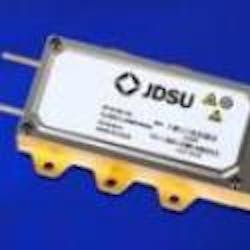Fiber laser for metal cutting and shaping
Milpitas, CA - JDSU has introduced two lasers that bring new efficiencies to the manufacturing and life sciences markets: the ST series of fiber laser pumps and the FCD561 Series for Life Sciences.
ST series of fiber laser pumps
JDSU introduced its ST Series fiber laser pump featuring a bright fiber-coupled diode laser performance. This design, powered by JDSU’s next-generation diode laser chip, offers 140 W of output power within a 106.5 micron core that will accelerate the adoption of fiber lasers by machine-tool makers and speed metal cutting and shaping manufacturing processes.
A continuous need for finished metal goods and the displacement of competing cutting technologies have resulted in the rapid growth of the fiber laser market, bringing strong demand for diode laser pump sources that produce the necessary high power and brightness. The ultra-compact ST Series is a highly integrated device which reduces the number of components needed to produce a kilowatt-class fiber laser, resulting in simpler, lower cost and more robust design alternatives.
"The introduction of the ST Series enables a simple fiber laser architecture that brings the power of fiber lasers to a wider range of customers," said Tomoko Ohtsuki, Industrial Diode Product Line Manager. "Combined with optical and mechanical design innovations to achieve ultra low optical loss and thermal management, JDSU establishes a new foundation for high-brightness laser pumps."
JDSU FCD561 Series for life sciences
JDSU also introduced its FCD561 Series, the newest addition to its frequency converted diode (FCD) family of continuous-wave lasers for the life sciences market. Commonly used in the health services industry to identify health disorders in both clinical and research environments, flow cytometer instruments use laser light sources of specific wavelengths to identify characteristics of cells, proteins, and other particles.
FCD561 allows for targeted fluorescent pumping of specific fluorophores at their ideal absorption band, minimizing the amount of needed incident laser power and reducing the potential for pumping of adjacent fluorophores within a sample. This process increases the overall sensitivity of flow cytometers resulting in statistically improved results and the ability to observe population data that may not have been resolvable previously. Using an efficient 561 nm solution, the FCD561 brings the reliability and efficiency needed to allow JDSU’s bioinstrumentation customers to pump yellow-green fluorophores currently not covered by more common direct-diode laser systems or lesser performing alternate laser technologies. This new solution features 30mW free-space and fiber-delivered packages to meet the most demanding integration needs.
